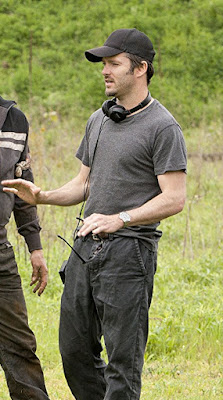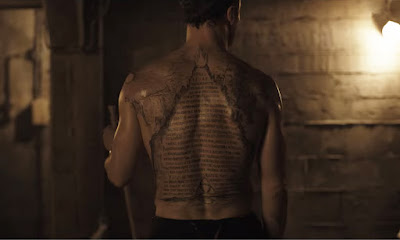The box art for RUSSIAN DOLL explains (or maybe proclaims) the movie to be, via its subtitle description, (A Thriller) -- in parentheses, yet, in case, I guess, we might want to consider this as parenthetical. Indeed there is not a single thrill to be found here. There is, however, a whole lot of genuine laughs, most of these completely unintentional, I fear.
Which means that this movie takes its place among those hallowed few films that rise, completely of their own accord, into the realm of unintentional camp.
As written and directed by Ed Gaffney (shown at right, whose earlier work as screenwriter, The Perfect Wedding, this reviewer thoroughly enjoyed), Russian Doll begins and ends with a genuine surprise. The first of these turns what has initially looked just slightly off-kilter into something that makes perfect sense. The final surprise has to do with identity, and I admit that I did not at all expect it. So I applaud. Very good, Mr. Gaffney!
The problem, however, is that between these two surprises, almost everything else seems bat-shit crazy, including the performances of much of the cast, especially our leading lady, Melanie Brockmann Gaffney (I suspect she is the filmmaker's wife), who, whatever other talents she possesses, acting is not among them, and Jason T. Gaffney (the filmmaker's son?), who was so very good in his rom-com role in The Perfect Wedding, but here plays a villain (shown below with his victim, played by Aly Trasher) who keeps making us laugh. Unintentionally, I admit. But that's not what villains are supposed to do.
The plot has to do with a theatrical play, the authorship of which may have been stolen; a sudden kidnapping (that actually makes very little sense overall); and a theatrical production of said play (named Russian Doll) that is occurring simultaneously with the kidnapping and a budding romance between our heroine, a police detective (Ms Gaffney, at left on poster, top) and a very pretty, sexy young woman with whom the detective's mom (Kristine Sutherland, below) has set her up.
All comes together in as clunky a manner as the above description sounds, with the kidnapper and his kidnapee especially hilarious, as the latter keeps escaping and the former keeps telling her that he's going to kill her if she keeps this up. She does, of course, and he doesn't. Somewhere along the way, the filmmaker inserts a song, the lyrics of which prove as awful (and as funny) as everything else on display. (We happened to have the English subtitles on as we watched and so got a double dose, aural and visual.)
At one point or another, my spouse and I began laughing aloud at the increasingly silly goings-on and, as can happen with this kind of laughter, it simply grew and grew until we were actually having a pretty good time. Add to this the automatic corrective that a truly awful movie can provide to just about everything else you've seen, mediocre on downward. Russian Doll managed this, and I am grateful. Now I truly understand what bad looks like. (That's the other leading lady, played by Marem Hassler, above, right, and Sarah Hollis, below, right, as our heroine's police partner, who tries to be smart and sassy but is defeated at every turn by the script.)
Distributed by Wolfe Video and running at least a short 82 minutes, the movie hits the street on DVD tomorrow, Tuesday, April 17 -- for purchase and/or maybe rental. To all of you -- performers, filmmakers, audiences -- good luck!










































